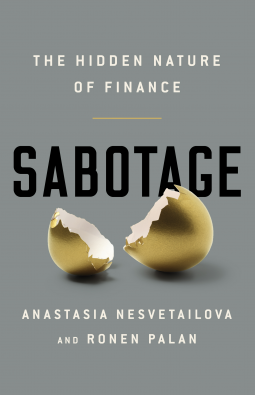
Sabotage
The Hidden Nature of Finance
by Anastasia Nesvetailova; Ronen Palan
This title was previously available on NetGalley and is now archived.
Buy on Amazon
Buy on BN.com
Buy on Bookshop.org
*This page contains affiliate links, so we may earn a small commission when you make a purchase through links on our site at no additional cost to you.
Send NetGalley books directly to your Kindle or Kindle app
1
To read on a Kindle or Kindle app, please add kindle@netgalley.com as an approved email address to receive files in your Amazon account. Click here for step-by-step instructions.
2
Also find your Kindle email address within your Amazon account, and enter it here.
Pub Date Jan 28 2020 | Archive Date Dec 17 2020
Perseus Books, PublicAffairs | PublicAffairs
Talking about this book? Use #Sabotage #NetGalley. More hashtag tips!
Description
I don't like the word 'sabotage',"--a former Goldman Sachs trader admitted. "It's just harsh.... Though, frankly, how else do you make money in this business...I mean, real money."
The fundamental motive for financial innovation is not to make the system work better, but to avoid regulation and oversight. This is not a bug of the financial system, but a built-in feature. The president of the US is not a tax avoider because he is an especially fraudulent financier; he's a tax avoider because he is a wealthy man in a system premised on such deceit. Finance is an industry of sabotage.
This book is a brilliant, intellectual detective story that traces the origins of financial sabotage, starting with the work of a prescient American economist who saw the capacity for banks and businesses to dissemble and profit as early as the 1920s. What was accomplished modestly in the first half of the 20th century became a booming global industry in the 1980s. Financialization took over everything, culminating in instruments so complex and confusing their own creators were being destroyed by them in 2008.
With each financial bust, people expect to hear who the culprit was, and cynically know to not expect much punishment to ever reach them. But the innovation of this book is to show that each individual gaming the system isn't a crook---the whole system is sabotage.
The fundamental motive for financial innovation is not to make the system work better, but to avoid regulation and oversight. This is not a bug of the financial system, but a built-in feature. The president of the US is not a tax avoider because he is an especially fraudulent financier; he's a tax avoider because he is a wealthy man in a system premised on such deceit. Finance is an industry of sabotage.
This book is a brilliant, intellectual detective story that traces the origins of financial sabotage, starting with the work of a prescient American economist who saw the capacity for banks and businesses to dissemble and profit as early as the 1920s. What was accomplished modestly in the first half of the 20th century became a booming global industry in the 1980s. Financialization took over everything, culminating in instruments so complex and confusing their own creators were being destroyed by them in 2008.
With each financial bust, people expect to hear who the culprit was, and cynically know to not expect much punishment to ever reach them. But the innovation of this book is to show that each individual gaming the system isn't a crook---the whole system is sabotage.
Available Editions
| EDITION | Other Format |
| ISBN | 9781610399685 |
| PRICE | $27.00 (USD) |
| PAGES | 272 |



